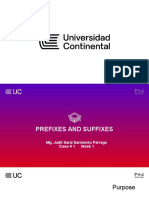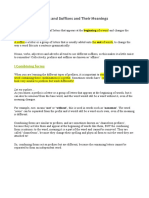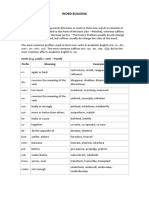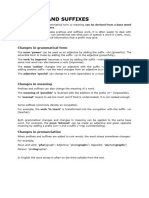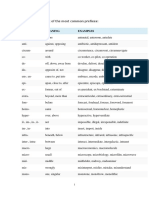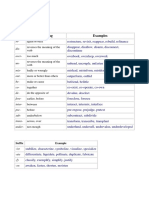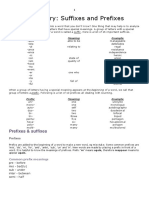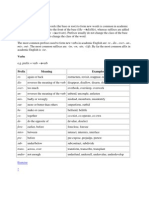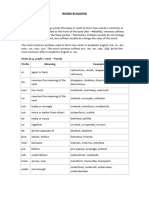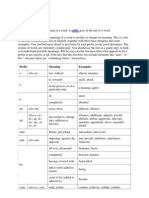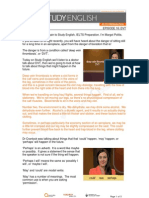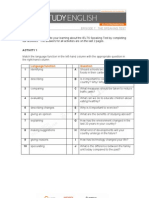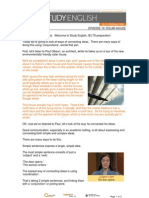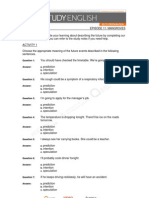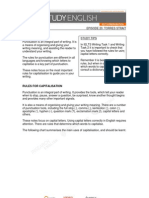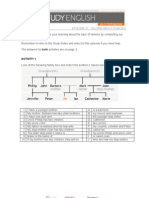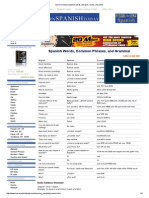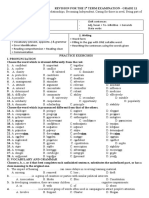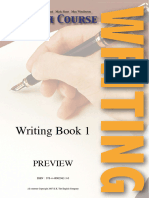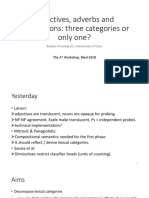STUDY NOTES
EPISODE 24: WORD FORMATION
WORD FORMATION
Many words in English are formed from the same root or base of a word. Using the word joy as a base for example, there is a range of words that can be formed. Adding en- to joy forms enjoy and such words as enjoyable, enjoyably, enjoyment, and there is also joyful, joyless and joyous. There is even a relatively new word joystick which is a device used to control an airplane or computer game. These words were formed in four different ways, including: prefixes suffixes converting compounding IELTS Tip When you come across an unfamiliar word in your reading, try to work out the meaning from the parts of the word you may know. For example, check whether you recognise the prefix, suffix or any other part. Through association take a guess what the word might mean.
Learning the meanings of prefixes and suffixes and knowing how to convert and make compound words can help you to extend your vocabulary and work out the meaning of unfamiliar vocabulary. It also helps to remember the meaning of words more easily. Prefixes Here is a list of some of the more common prefixes and words commonly used with them.
Prefix aanti-, antautobicodedisecoexhyperhypoil-, im-, in-, irin-, imMeaning in a particular state, in the process of against, opposing self two, twice with to reverse, to remove, opposite action to remove, to reverse, opposite action, negation relating to the environment former, previous more than usual less than usual not, without in, toward, inside Examples asleep, awake, aside, aback, anew antisocial, antioxidant, antidote, anti-aircraft, antipasto, antiperspirant, antiseptic, antipollution, anti-virus autobiography, autograph, autoimmune, automobile, autocue, autonomy, autopilot biannual, bicycle, bicentenary, bilingual coexist, cohabit, coeducational, co-author, cooperate, co-pilot, co-worker deforestation, dehydration, decaffeinated, defrost, devaluation, detoxification (detox) disinfect, disadvantage, disagree, disapprove, disconnect, disqualify eco-friendly, ecosystem, eco-tourism, ecotourist, ecology ex-president, ex-smoker hyperactive, hypertension, hypertext, hypermarket, hyperventilate hypochondria, hypothermia illegal, inappropriate, impossible, impolite, irrational, irresponsible input, intake, import
Page 1 of 4
�intermisnon-
between, connected, among incorrectly, wrong not, opposite of
over-
too much
postprere-
after before again, back
subun-
below, under, secondary not, to remove, to reverse
well-
successful, useful
interaction, interchange, international, intergenerational, intercontinental, interdepartmental, interdisciplinary misunderstand, misspell, mistranslate, misinterpret, mistrial, misuse, mistreat, misfortune, mishandle, misplace non-smoker, non-alcoholic, non-dairy, nonstick, non-standard, non-specific, non-profit, non-prescription, non-negotiable, nonscientific, non-violent overpopulation, overeat, overload, overwork, overcharge, overdose, overdue, overfishing, overheat, overindulge, overpay, oversleep, overtime, overweight postgraduate, post-secondary, postindustrial, post-examination, postscript (PS) prefix, prepay, pre-2010, premature, precooked, prehistoric, preview replay, resend, rewrite, rename, replace, recycle, redial, recover, rebuild, recall, reformat, refuel, removable, renew, reorder, repay, reschedule subsection, subway, substandard, submarine, substation, subtitle, sub-zero, subtotal unhappy, unkind, uncertain, unusual, unable, unaware, unbalanced, unbelievable, unbiased, uncomfortable, uncooked, undecided, unemployed, unemployment, unequal, unpaid, unreliable well-balanced, well-dressed, well-educated, well-being, well-run, well-written, well-built
Suffixes Here is a list of some of the more common suffixes which form adjectives, nouns and verbs, and words commonly used with them.
Suffixes forming adjectives Suffix -able, -ible -al -ful -ian -ive -less -like -ous Meaning able to be done, capable of being relating to having the characteristic of relating to, nationalities something that is without resembling having the characteristic of Examples readable, drinkable, useable, washable, responsible, visible, suitable, knowledgeable national, informal, political, seasonal, criminal joyful, helpful, forgetful, powerful, grateful, successful, wonderful, cheerful, beautiful, peaceful Australian, Canadian, Austrian, Cambodian, Egyptian, Iranian, Indian, Jordanian, Slovakian, Russian, Ukrainian attractive, effective, imaginative, productive, persuasive, repetitive homeless, worthless, hopeless, nameless, effortless, meaningless, useless child-like, business-like, mouse-like delicious, famous, dangerous, enormous, generous
Page 2 of 4
�Suffixes forming nouns Suffixes -ant/-ent Meaning someone who does something or something that has a particular function someone who does something someone who does something, something that does a particular job belief, behaviour, theory or act of person connected with, belief in forming abstract nouns quality or state quality or state Examples student, president, resident, assistant, defendant, accountant, deodorant addressee, interviewee, referee, trainee, employee, refugee, trustee, lessee, retiree writer, teacher, worker, dancer, buyer, actor, supervisor, hammer Buddhism, humanism, journalism, feminism, criticism, alcoholism, vegetarianism, Buddhist, humanist, journalist, feminist, pianist, violinist, cellist government, enjoyment, management, development, employment, investment, achievement happiness, kindness, forgiveness, goodness, sadness, weakness, thickness, thinness, darkness population, computerisation, discussion, excursion, complication, formation, confusion
-ee -ar, -er, -or -ism -ist -ment -ness -sion, -tion
Suffixes forming verbs Suffix -ate -en -ify -ise (-ize*) *North American English Meaning to bring about a state to become to make something, to become to do something, to become Examples demonstrate, generate, communicate, suffocate, illustrate, separate, segregate, legislate, validate, immigrate, motivate widen, thicken, ripen, lengthen, strengthen, lighten, shorten, darken identify, clarify, simplify, glorify, modify, purify, solidify criticise, computerise, realise, rationalise, standardise, modernise, nationalise, homogenise, idealise, optimise, popularise, sanitise
Converting A word can change from one part of speech to another without adding a prefix or suffix. This is called conversion or converting. Here are some of the more common type of conversions and examples.
Converting verbs nouns nouns verbs adjectives verbs nouns verbs by stress to drink a drink; to speed speed; to work work; to laugh a laugh head to head (a committee); e-mail to e-mail; humour to humour (someone) calm to calm; smooth to smooth (something over/down/into) nouns verbs abstract abstract accent accent address address ally ally combat combat
Page 3 of 4
�compound conduct conflict console contest contrast converse convert decrease desert (cf dessert) discount export finance increase insult object present produce progress project protest record recount refuse research subject suspect transfer transport upset
compound conduct conflict console contest contrast converse convert decrease desert discount/discount (North America) export finance increase insult object present produce progress project protest record recount refuse research subject suspect transfer transport upset
Compounding Compound words are found in all parts of speech, but the most common are those formed with adjectives, nouns and verbs.
Compound adjectives function: object + -ed/-ing others dark-haired, English-speaking, brown-eyed, right-handed, long-sighted, easy-going, broad-shouldered, airconditioned fat-free, duty-free, interest-free, hand-made, first-class, part-time, dry-roasted, light-blue
Compound nouns subject + verb verb + subject object + verb noun + noun from phrasal verbs Compound verbs derived from another part of speech to babysit, to daydream, to dry-clean, to sightsee bus stop, car park, heart attack, headache, car alarm answering machine, chewing gum, steering wheel, alarm clock, driving school global warming, food poisoning, blood donor, data processing greenhouse effect, bank account, junk food, mothertongue, death penalty, human rights check-out, crack-down, break-up, turnover, print run
Page 4 of 4



